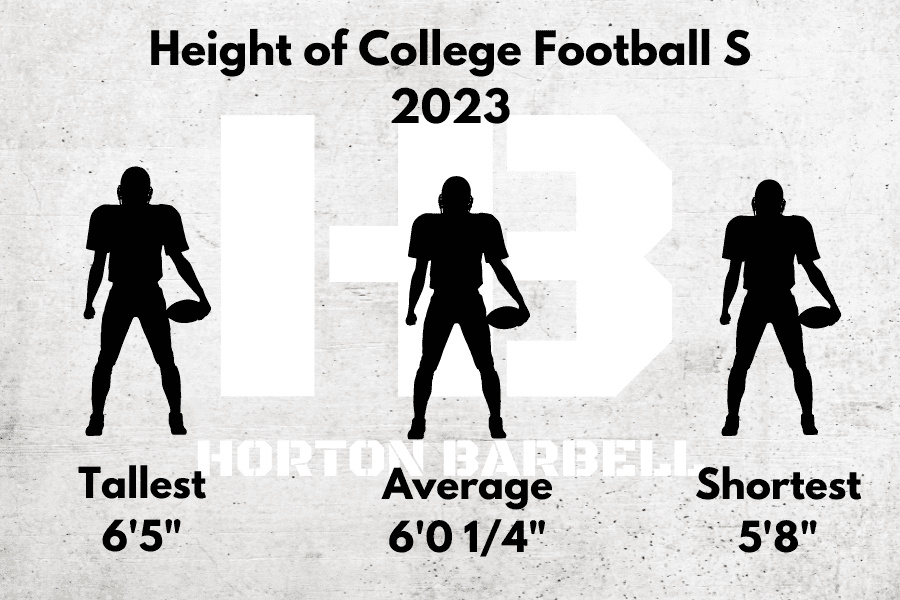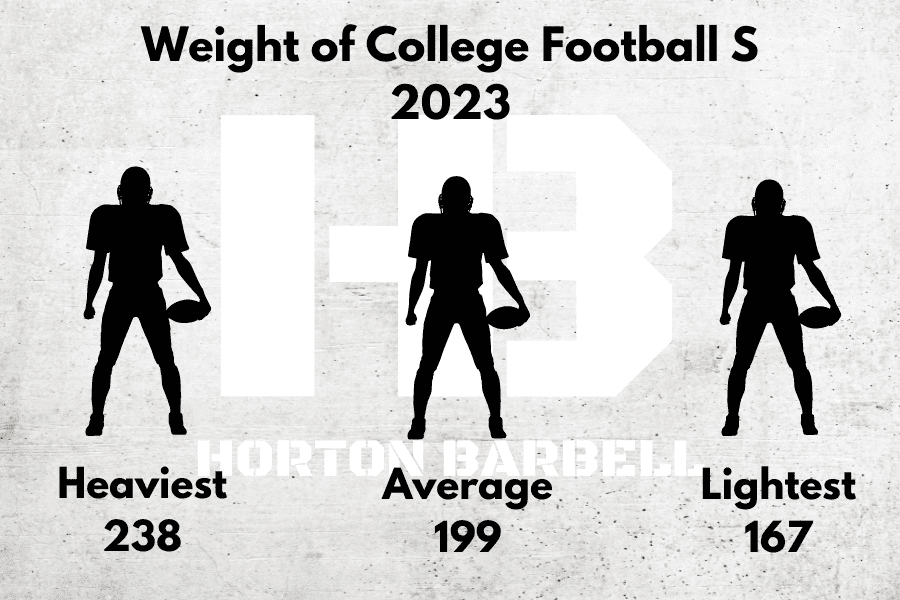Average Size of College Football Safeties (Height & Weight)
I’ve been a collegiate sports performance coach for 20 years. One thing I always loved doing was going through and checking out the sizes of the other teams in our conference.
It helped give me (and our staff) an idea of how we stacked up against our competition. It also could be used as motivation with our team both during the season and, often, during the following off-season.
So, this is essentially the same research I’ve always done, but now I’m sharing it with you. I took starting depth charts for each team in the FBS (a total of over 3000 players) going into the 2023 season and broke them down by position.
For this guide, I took an average of the heights and weights of the over 300 starting Safeties* across college football. In addition, I broke down the sizes of safeties by conference and individual players.
Go ahead and impress someone today with your trivia bona fides.
Average Height of a College Football S
The average height of a College Football Safety is 72.3 inches (just over 6’0 1/4″).

Average Weight of a College Football S
The average weight of a College Football Safety is 198.62 pounds.

Want to see how college football Safeties compare with the size of NFL Safeties? Good news, I’ve also run the numbers on the guys at the next level.
Which Conference Has the Tallest Safeties?
| Conference | Avg Height (Inches) |
|---|---|
| MAC | 72.86 |
| ACC | 72.7 |
| Big 10 | 72.69 |
| SEC | 72.67 |
| Pac 12 | 72.48 |
| Conference USA | 72.33 |
| Big 12 | 72.26 |
| Mountain West | 72 |
| Independents | 71.91 |
| Sun Belt | 71.86 |
| AAC | 71.5 |
Which Conference Has the Heaviest Safeties?
| Conference | Avg Weight |
|---|---|
| SEC | 203.85 |
| Big 10 | 200.8 |
| Independents | 200.55 |
| Big 12 | 199.94 |
| ACC | 199.23 |
| Mountain West | 198.53 |
| Pac 12 | 198.26 |
| MAC | 197.38 |
| Conference USA | 197.08 |
| Sun Belt | 195.53 |
| AAC | 194.49 |
Who Are the Tallest Safeties in College Football?
There are 10 different safeties, from different conferences all over the country listed at 6’4″.
However, there is only one who stands above the rest, listed at 6’5″.
| Name | Height | Weight | School |
|---|---|---|---|
| James Williams | 6’5″ | 215 | Miami |
Who Are the Shortest Safeties?
Historically, safeties are generally the taller players in the secondary.
Many defensive schemes nowadays in college football run a third safety position that acts almost like a nickel back. This is the position that each school names differently – Jack, Star, Owl, etc.
These players are often tough, playmaking athletes who aren’t always the 6’2″ prototype safety.
With all that said, there are over 100 safeties under 6 feet tall, a dozen of those are under 5’10” and 3 are listed at 5’8″.
| Name | Height | Weight | School |
|---|---|---|---|
| Kam Pedescleaux | 5’8″ | 196 | Tulane |
| Jaylen Stinson | 5’8″ | 170 | Duke |
| Rodney Robinson | 5’8″ | 185 | Boise State |
Who are the Heaviest Safeties in College Football?
Big safeties can oftentimes be as big (if not bigger) than linebackers.
The five biggest starting safeties in college football this year all weigh 220 pounds or more.
| Name | Height | Weight | School |
|---|---|---|---|
| Justin Barron | 6’4″ | 231 | Syracuse |
| Zion Puckett | 6’0″ | 226 | Auburn |
| Michael Dowell | 6’1″ | 221 | Miami (OH) |
| Kolbi Fuqua | 6’3″ | 220 | Jacksonville State |
| Kamari Wilson | 6’0″ | 220 | Florida |
Who are the Lightest?
On the other end of the scale, the five lightest safeties all weigh 170 pounds or less.
| Name | Height | Weight | School |
|---|---|---|---|
| Logan Wilson | 5’10” | 167 | North Texas |
| Jaylen Stinson | 5’8″ | 170 | Duke |
| Jarron Morris | 5’9″ | 170 | Florida Atlantic |
| Charles Arnold Jr | 5’10” | 170 | Coastal Carolina |
| Quadric Bullard | 6’0″ | 170 | Central Florida |
Important Notes
As a former sports scientist, I tend to take data pretty seriously so I must stress that these ‘averages’ should be used for entertainment purposes only.
Why do I say that?
There are multiple issues that can make all the data in this article flawed.
First and foremost, it’s pretty commonplace in athletics to lie about heights and weights. I once worked at a school where it was standard procedure to add an inch and 5 to 10 pounds to almost every player on the roster.
Why?
The best answer that I was ever given is that it could potentially help with NFL scouting. However, I can’t imagine in 2023 that anyone is fooling an NFL scout with the size listed in a program. I think the real answer is it’s just part of the culture in sports.
*I used the heights and weights of all the projected starters leading into Week 1. Whether it’s through injury or performance, starters can and will change throughout the season.
In fact, it took me a week to gather all these numbers and by the time I was done I would bet that there were at least a couple of starting positions that had already changed hands.
And, if a couple of 6’2″ 210-pound players are swapped out with a couple of 5’9″ 175-pound players, the sample size is small enough that this could substantially affect the overall averages.
Finally, I can tell you for a fact that players’ weights can fluctuate pretty wildly from week to week and sometimes even day to day and, especially, over the course of a season.
Just because a guy weighed 200 on the first day of camp when weights were put in the program, does not mean that’s what he weighs in Week 8.
So, have fun with the data above, but this is just a reminder to not take the numbers too seriously.
More Info
I also broke down the sizes of Defensive Linemen across college football that you can check out.
Or, if you really want to have your mind blown, check out the fastest 40 times that safeties have put up at the NFL Combine over the years.
Finally, you may not be able to control how tall you are, but you can control how hard you work and how smart you work. I can’t help you with your work ethic, but I have put together a Strength and Conditioning Guide for Football.

